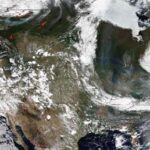Last week, hundreds of students, scientists, policy-makers, and business leaders met at the University of Maryland (UMD) to discuss the ever-urgent topic of climate action. Designed as a lead-in to the two-day United Nations sponsored Climate Action Summit held in Washington, D.C. on May 5 – 6, the forum offered a platform for public discussion between a wide variety of stakeholders and interest groups.
The event, which was co-organized by members of the UMD academic community, including ESSIC Interim Director Fernando Miralles-Wilhelm, brought in a number of heavy-hitting policy makers to initiate the conversation.
Among the opening keynote speakers was University President Wallace Loh, who relayed the importance of taking an interdisciplinary approach to tackling the issue of climate change.
“We may reach a tipping point where the effects [of climate change] are irreversible. It requires involvement from all of us- from business, from finance, from civil society, and from academia,” Loh said. “We have to mobilize the entire university. We have to help transform society and the economy. I can think of no higher responsibility for those of us at the university than to imbue our whole curriculum, regardless of the subject matter, an understanding and a commitment of doing what needs to be done.”
One of the most prominent topics throughout the forum was the relationship between the environment and the economy. While President Loh insisted that the country move toward a more “climate reliant” economy, other leaders such as Maryland Senator Ben Cardin reinforced the idea that the environment and the economy are interdependent.
“We’re going to create more jobs as a result of dealing with climate change. It’s the right thing to do for our environment. It’s the right thing to do for our economy,” Cardin asserted. “This is not a heavy lift. The American public overwhelmingly supports our efforts to continue to be a leader on climate issues. From environmentalists to business leaders, they support U.S. leadership on dealing with climate change.”
Cardin has been heavily involved with the United Nations’ efforts to curb the effects of climate change. Last December, he led a coalition of U.S. senators to Paris to support the United Nations Conference on Climate Change Agreement. The Paris agreement was ultimately signed by 177 countries, an impressive feat for any environmental initiative.
In the spirit of the Paris agreement, Cardin is bringing proposals of his own back to the United States. Last March, he and two other senators filed resolutions in both the House and the Senate to establish a goal of producing at least 50% of our electricity using non-carbon sources by 2030. The resolution is co-sponsored by 30 members of the Senate and 103 members of the House.
Former Maryland Governor Martin O’Malley has also had considerable experience taking the message of climate action across the country. Participating in a Q&A session at the end of the Climate Forum, O’Malley stressed the significance of communicating climate action as an opportunity, rather than a burden.
“It’s important that we wrap this in the prosperity framework,” O’Malley said. “All across our country, when I would say this phrase- that climate change is the greatest business opportunity to come to the United States of America in 100 years- people would applaud. We need to tell the story in the narrative that it’s going to be a future with more- more prosperity, more health, and more opportunity. That’s the key.”
As O’Malley explained, it is only a matter of time before the rest of the nation decides to face the reality of climate change, especially in areas where extreme weather events are growing in size and in number.
“I saw in the interaction between the 50 men and women that are the nations governors, that the increasingly frequent and ever-more violent storm events have made converts out of a lot of governors in states that even a term or two ago were climate deniers,” O’Malley contended. “They’re not denying anymore. Not in Oklahoma. Not in Louisiana.”
Throughout the Climate Forum, one point was made abundantly clear: it takes a collective effort to combat climate change. With members of academia and the public and private sector present, the forum gave leaders like O’Malley an opportunity to emphasize the importance of taking action.
“Small things done well make bigger things possible,” O’Malley, concluded. “Today, we have the ability to map and measure the very impactful human actions in such a way that we can actually inspire and encourage people. We can support a growing consensus to take even stronger action.”






